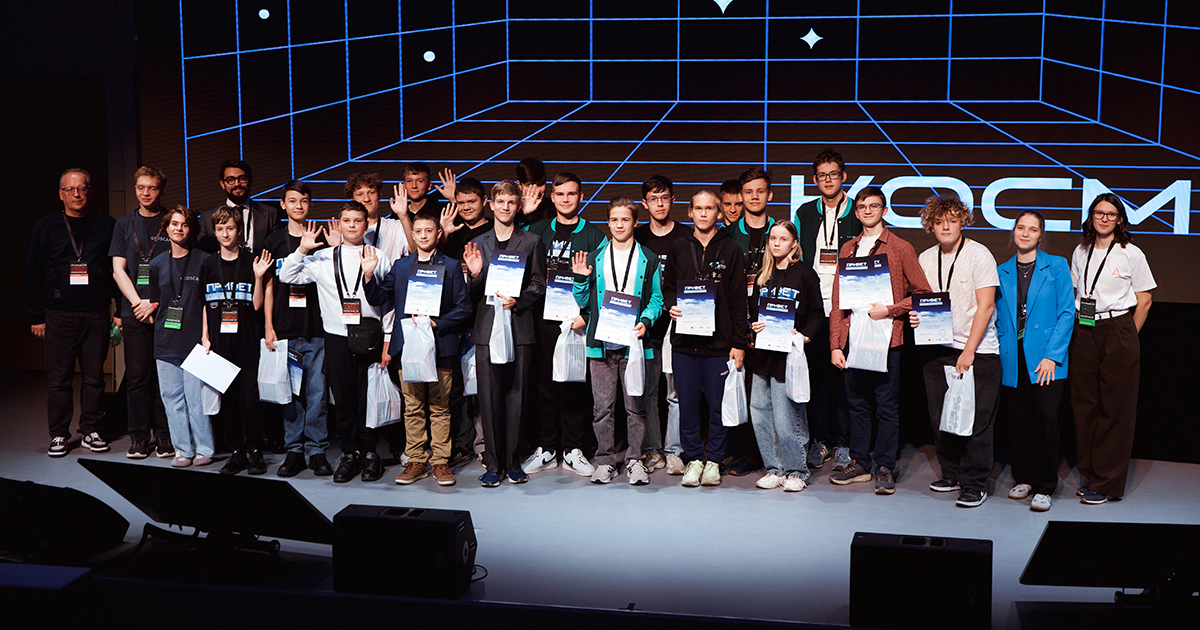Today, Moscow became the focal point of discussions on the future of private space exploration and open technologies as it hosted the technology and science conference “Making Space Open – 2025”. The event brought together leading experts, scientists, representatives of commercial companies and educational initiatives, and was held at the Lomonosov Cluster. An online broadcast was also available to the public, attracting more than 500 viewers.
Satellites and Technologies
The conference program was highly eventful and covered the full range of Geoscan Group’s current space activities — from satellite development and educational initiatives to forward-looking strategies.
Kirill Starikov, Head of Small Spacecraft Ground Systems Department at Geoscan, spoke about the development of the Geoscan 16U platform and, in particular, about InnoSat16 — the first Russian 16U satellite launched into orbit. The CubeSat’s main objectives are flight testing and Earth remote sensing. The session also presented data from seven experimental satellites based on the 3U platform, launched earlier this summer.
Andrey Manoilo, CEO of Gonets Satellite System JSC, spoke about joint projects with Geoscan and shared details of an ongoing high-speed data transmission experiment being carried out on Geoscan CubeSats. He noted that the technologies tested on the Geoscan-4 and Geoscan-5 satellites make it possible to deploy part of a communications satellite constellation as a secondary payload and quickly scale it up when needed. This lowers service costs and opens up opportunities to enter promising market segments.
Stepan Tkachev from the Keldysh Institute of Applied Mathematics of the Russian Academy of Sciences presented the progress and results of developing mathematical algorithms for the attitude determination and control system of small spacecraft. Dmitry Svinkin from the Ioffe Institute delivered a talk on gamma detectors that capture the most powerful explosions in the universe and shared the first results from 239Alferov — a CubeSat that carried 7,787 names and over 3,500 images from participants of the “Send Your Name to Space” campaign.
Educational Programs and Open Technologies
Alexander Khokhlov, Head of Small Spacecraft Projects Department at Geoscan, spoke about the Space-π project, through which school and university students take part in creating CubeSats, mastering modern technologies, and conducting experiments in orbit.
“Over nearly five years of developing Geoscan’s space program, we’ve achieved so many milestones that organizing a conference like this was a natural step. It’s especially gratifying that both in our daily work and here at the event we’ve met many partners — and even more curious space enthusiasts for whom the successes of private Russian companies have become a true source of inspiration,” said Alexander Khokhlov.
A key focus of the conference was open technologies, Irina Mitrofanova, a web developer at Geoscan, announced upcoming plans for the SONIKS project — a platform that will connect satellite users worldwide, enabling not only telemetry reception but also control of educational satellites via the SONIKS Mission Control Center.
Maria Kuporova, an education specialist at Geoscan, presented a new continuing education course titled “Satellite Operator.” The program introduces school students to the space industry and the work of Mission Control Center specialists.
Plenary Session
The culmination of the day was the visionary session “Deep Space? Only Together!”, led by Geoscan’s Advisor to the CEO, Andrey Ionin. The participants discussed the opportunities for small and medium-sized companies in international projects, the paths to commercializing technologies, and the new tasks of Roscosmos.
“Global space exploration is now going through a real revolution. Everything is changing, and that opens up incredible opportunities for everyone. Exploring the Moon or Mars is only possible through the combined efforts of all nations. It will require the knowledge and resources of every industry, technology, and scientific field. Not only large corporations can take part in this process — the scope of work is so vast that there’s room for companies of every size. Everyone can and should make their contribution,” emphasized Andrey Ionin.
Hackathon
Alongside the business program, the on-site final of the “Hello, Sputnik!” hackathon took place, organized with support from the Foundation for Assistance to Small Innovative Enterprises and bringing together 27 students from cities across Russia. Participants worked on a practical challenge — regaining control of a satellite and preventing an environmental disaster. The “Happy?” team took first place, and several participants also received special awards in individual categories. All finalists received certificates and commemorative prizes.
“The conference clearly showed that space is becoming closer to us. Even today, we’re building satellite constellations, conducting cutting-edge experiments, and nurturing a new generation of engineers. The future of the industry is being shaped through this kind of collaboration,” concluded Kirill Starikov.
